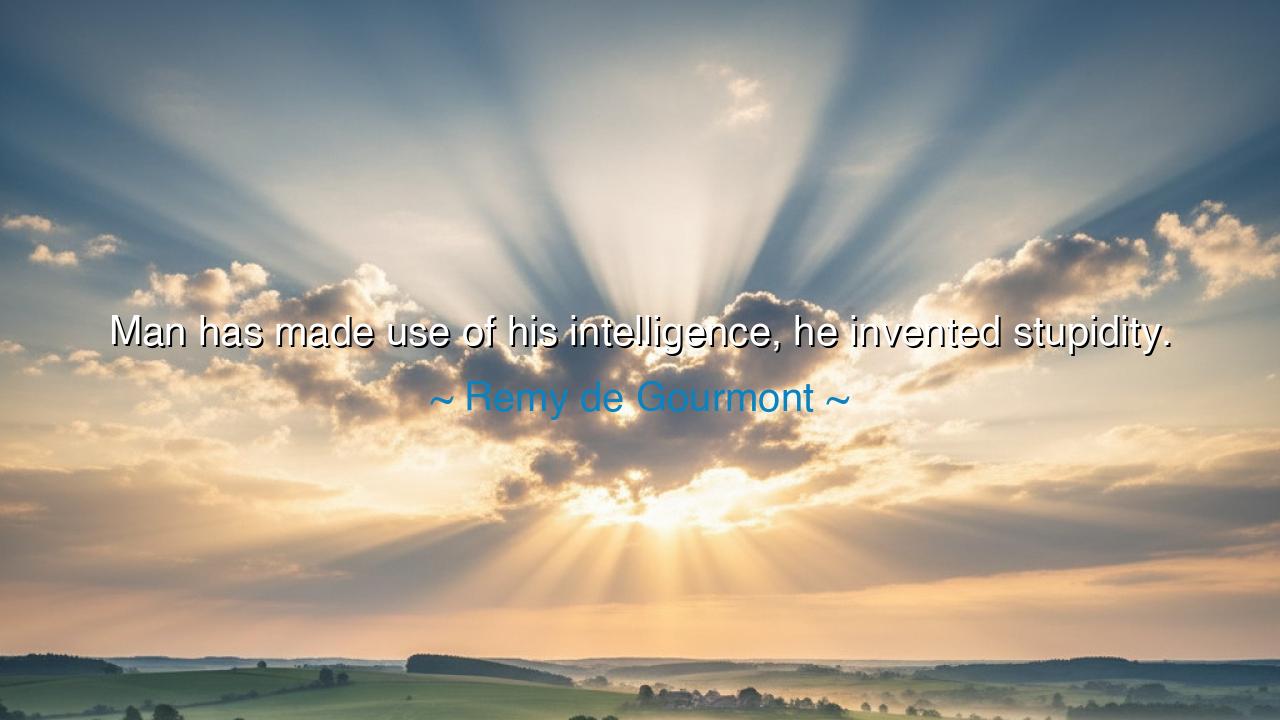
Man has made use of his intelligence, he invented stupidity.






“Man has made use of his intelligence, he invented stupidity.” — Rémy de Gourmont
Hear this, O children of thought and fire, for in this paradox lies one of the deepest truths of our kind. Rémy de Gourmont, the philosopher-poet of France, gazed upon the world of men and saw the strange comedy of our nature: that in our boundless intelligence, we have also forged our own stupidity. He spoke not in jest, but with the sigh of one who has watched wisdom turn upon itself. For every step man has taken toward enlightenment, he has found a way to stumble into darkness again. The same mind that builds temples and writes symphonies also creates war machines and false idols. Thus, the mind becomes both creator and destroyer, both torch and smoke.
Intelligence was given to man as a gift—perhaps even as a sacred trust. With it, he was meant to understand the stars, to cultivate beauty, to live in harmony with the earth. Yet, driven by pride, he turned his gift into a weapon. When he learned to make fire, he burned cities; when he learned to speak, he used words to deceive; when he learned to reason, he used logic to justify cruelty. This is the tragedy of stupidity born of intelligence—not the ignorance of the simple, but the blindness of the learned who believe themselves infallible. It is not the fool who causes the greatest harm, but the clever man who mistakes cunning for wisdom.
Consider the story of Oppenheimer and the birth of the atomic bomb. In that moment, the brilliance of human genius reached its zenith—and its abyss. The intellect that unraveled the atom’s mystery also unleashed a terror capable of erasing entire nations. “Now I am become Death,” he whispered, quoting the ancient scripture of India. Here was intelligence triumphant, yet transformed into stupidity—for what greater folly is there than to endanger all life in the name of progress? In his trembling words, the ancient wisdom of de Gourmont is reborn: man’s brightest flame casts the longest shadow.
But not all stupidity takes such monumental form. It creeps quietly into daily life, clothed in vanity, arrogance, and self-deception. The scholar who learns endlessly yet never listens; the ruler who believes himself chosen by destiny; the people who mistake noise for truth—these too are children of invented stupidity. For when intelligence serves only the ego, it loses its light and becomes darkness. Man, thinking himself wise, begins to act like the fool. The ancients warned us of this long ago: “The wise man knows that he knows nothing,” said Socrates—but few have the humility to live by those words.
Yet de Gourmont’s saying is not despair; it is revelation. He shows us that stupidity is not a curse of nature, but a creation of choice. Man invented it—therefore, man can unmake it. To do so, he must remember that intelligence alone is not wisdom. Knowledge without conscience is a sword in the hand of a child. True wisdom comes when the mind bows before truth, when the heart tempers thought with compassion, and when the soul remembers its limits. Only then does intelligence rise above its own shadow.
Look, then, to the examples of those who used their minds not to dominate, but to uplift. Albert Schweitzer, who turned his intellect toward healing; Mahatma Gandhi, who used reason to teach peace; Marie Curie, who pursued discovery with humility. Their intelligence was married to virtue, and thus remained pure. They prove that the mind, when guided by the spirit, becomes a vessel of light. It is only when guided by pride that it breeds stupidity and ruin.
So learn this, O seekers of truth: your mind is a mighty forge. Within it, you may shape miracles or monsters. Be not seduced by the illusion of your own cleverness. Let your intelligence serve wisdom, not vanity; creation, not destruction. Question your own thoughts, seek counsel from the humble, and let your knowledge be softened by mercy. For only when man learns to think with both his mind and his heart will he cease to invent stupidity—and begin, at last, to invent peace.






AAdministratorAdministrator
Welcome, honored guests. Please leave a comment, we will respond soon